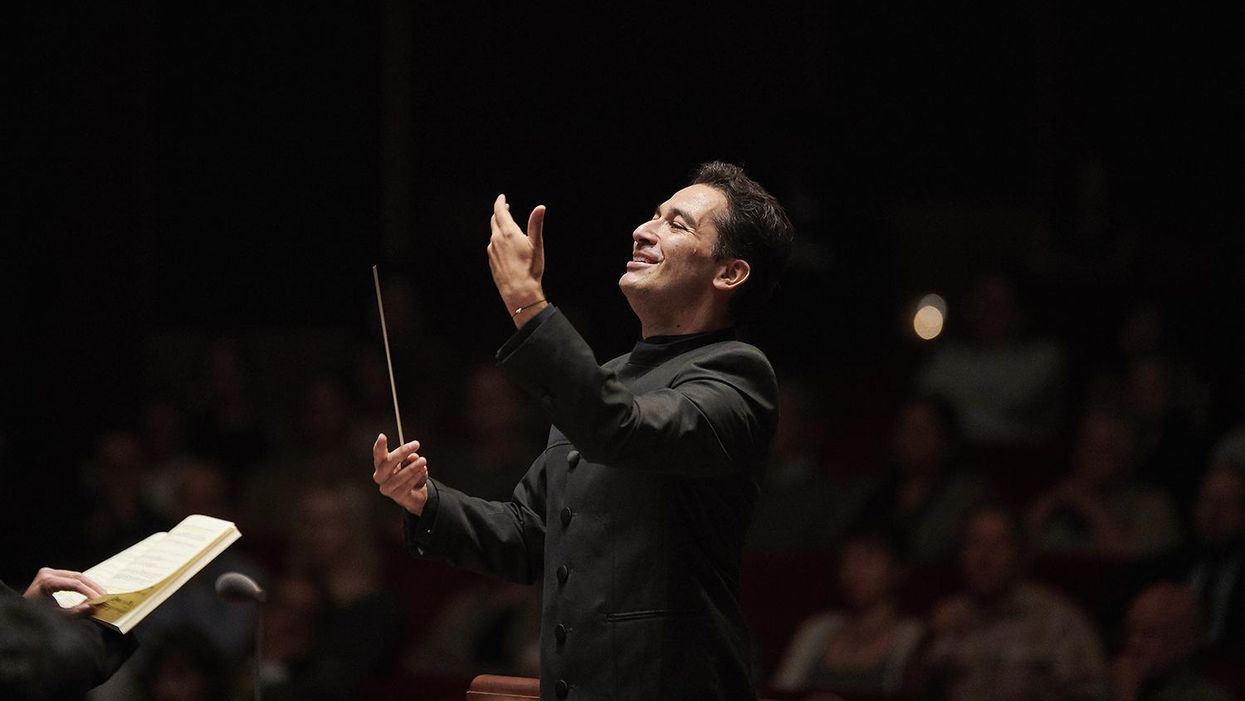Symphony Bids Adieu to Orozco-Estrada, Celebration Concludes with a ‘Startling’ New Concerto by Jazz Legend

Andrés Orozco-Estrada / photo by Anthony Rathbun for Houston Symphony
“ANDRÉS FEST,” A two-week celebration honoring the eight-year tenure of Houston Symphony Music Director Andrés Orozco-Estrada, concludes this weekend (March 26-27) with two concerts featuring the Texas premiere of Wynton Marsalis’ Concerto for Tubist and Orchestra.
Houston Symphony Principal Tubist, Dave Kirk is the soloist. Co-commissioned by the Philadelphia Orchestra and premiering in December by tubist Carol Jantsch, the four-movement work is an exciting addition to the tuba repertoire and is infused with the Marsalis’ deep understanding of jazz and how modern American music engages with the European canon. It’s also got a lot of notes.
“There’s more notes in this piece than I will play in the entire 2021-22 symphony season,” laughs Kirk, “and that includes Pops concerts, Family Series, warming up backstage — everything.”
Kirk, who has been the principal tubist since 1982, is referring to the fact that in most orchestral writing, the tuba takes on a vital but supporting role, usually playing the root of the harmonies, and supporting the percussion. For his contribution to the classical tuba repertoire, Marsalis draws on his experience as a New Orleans native, who grew up hearing the sounds of the sousaphone, a specially designed tuba used in second line brass bands and named after American composer John Philip Sousa.
“In New Orleans, the tuba takes on a very special role,” says Kirk, who met Marsalis when they were both students at The Juilliard School. “It gets the party going, and keeps the party going.” With that in mind, the concerto’s second movement, “Boogaloo Americana,” evokes the atmosphere of a New Orleans street party, and includes moments where the orchestra claps out a percussive background.
In contrast, the concerto’s third movement, “Lament,” is both introspective and wistful. Marsalis’ father Ellis, a master pianist and beloved mentor to countless jazz musicians, died from complications of Covid-19 on April 1, 2020 — but Kirk is reluctant to attach that tragedy to the emotional weight of the music. “When I play the solo part, the end of it, to me, seems very wrought,” says Kirk. “But when you listen to what the orchestra is doing, it’s not nearly as dark and as heavy as what the tuba part implies. It is more of a New Orleans kind of feel, where yes, there is a veil of tragedy, but at the same time, there is a spirit where you shouldn’t let it last too long.”
Kirk describes the concerto’s fourth and final movement, “In Bird’s Basement,” as “a serious departure from the lament.” “Bird” of course was the nickname of alto saxophonist Charlie Parker, one of the pioneers of bebop, where breakneck tempos and harmonic complexity merged and forever changed the language of jazz. “It’s very pyrotechnical,” says Kirk of the fourth movement. “It takes the tuba on a journey that most people would not expect in terms of technique and speed.”
For many listeners, as well as many members of the Houston Symphony, hearing a tuba play the melody for the entirety of a 20-minute concerto will be a new, even startling experience. But Kirk, like Marsalis, relishes the opportunity to open people’s ears.
“When you play a solo on the tuba, there’s a good chance that 95 percent of the people who hear you have never heard such a thing,” says Kirk. “It’s kind of cool that you can blow people’s minds when you do something like this.”

David Kirk (photo courtesy of Houston Symphony)

Wynton Marsalis (photo by Danny Clinch)
- Inside the Symphony's Million-Dollar Musical Evening - Houston ... ›
- Slovakian Conductor Juraj Valčuha Named As New Music Director ... ›
- One Drummer, Four Arms?! Hear a Limb-Defying Performance by the Symphony This Weekend - Houston CityBook ›
- All-Star Lineup of Musicians to Play 'Jazzy Sundays in the Parks' Concert Series, Kicking Off this Weekend - Houston CityBook ›
- Orozco-Estrada's Return, a Tribute to George Gershwin, and More Season Highlights from the Symphony - Houston CityBook ›


